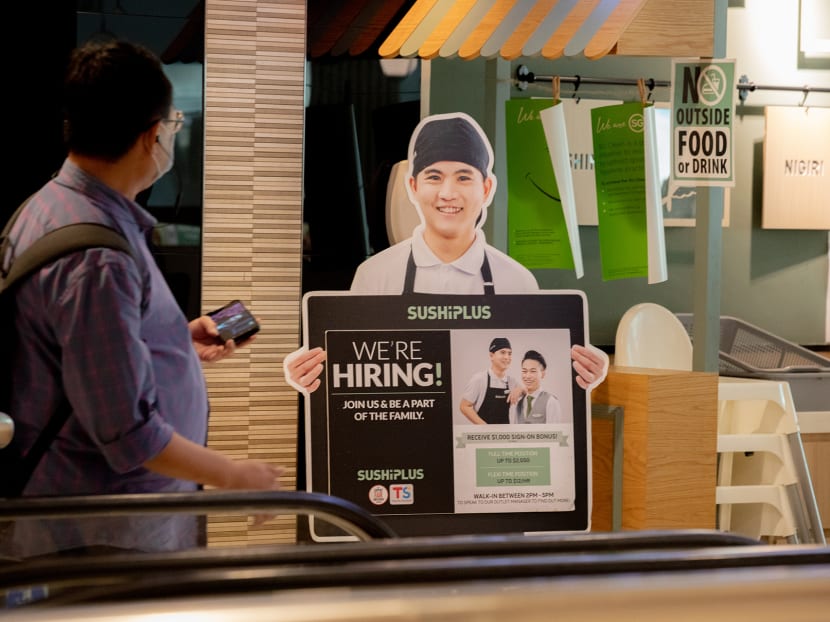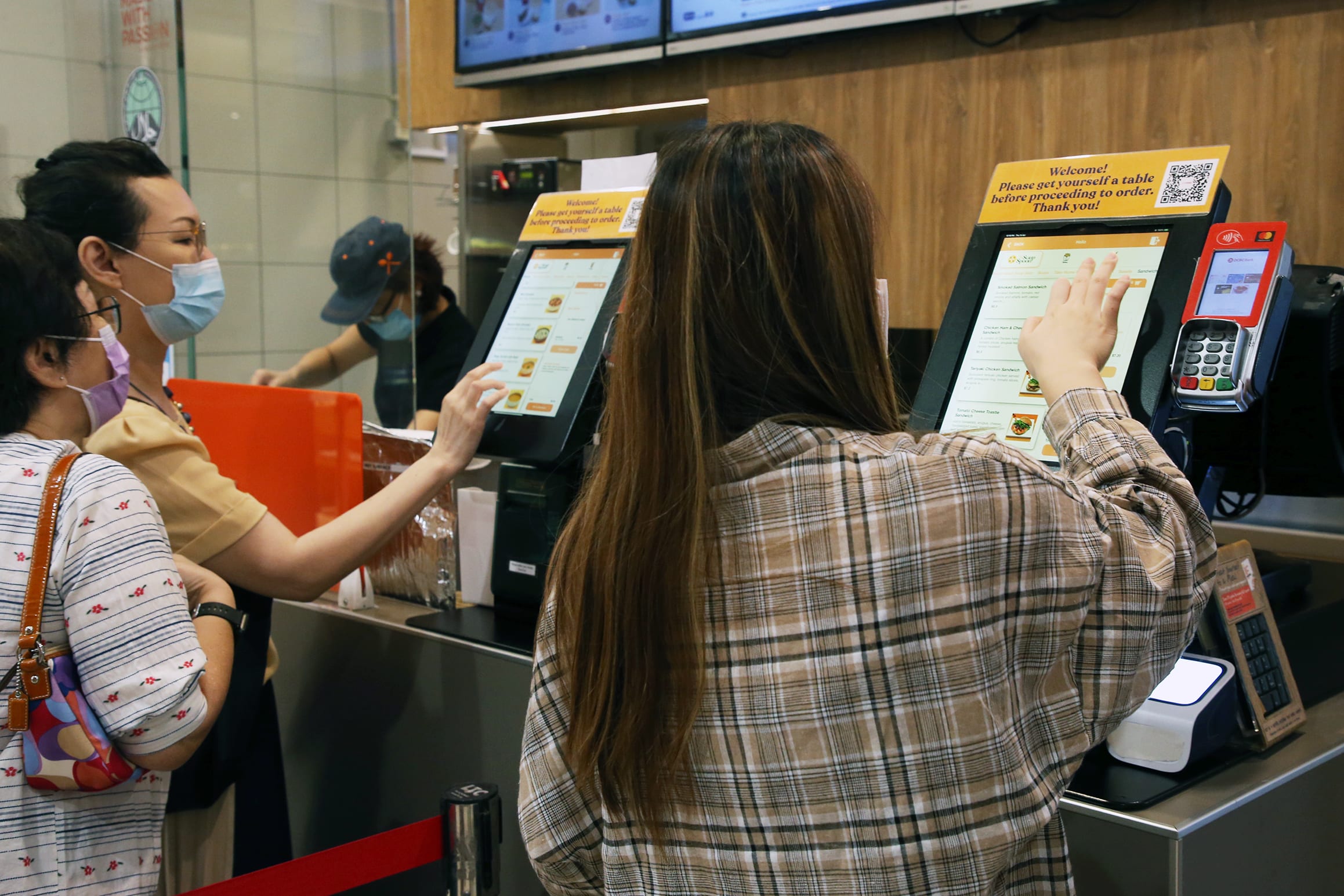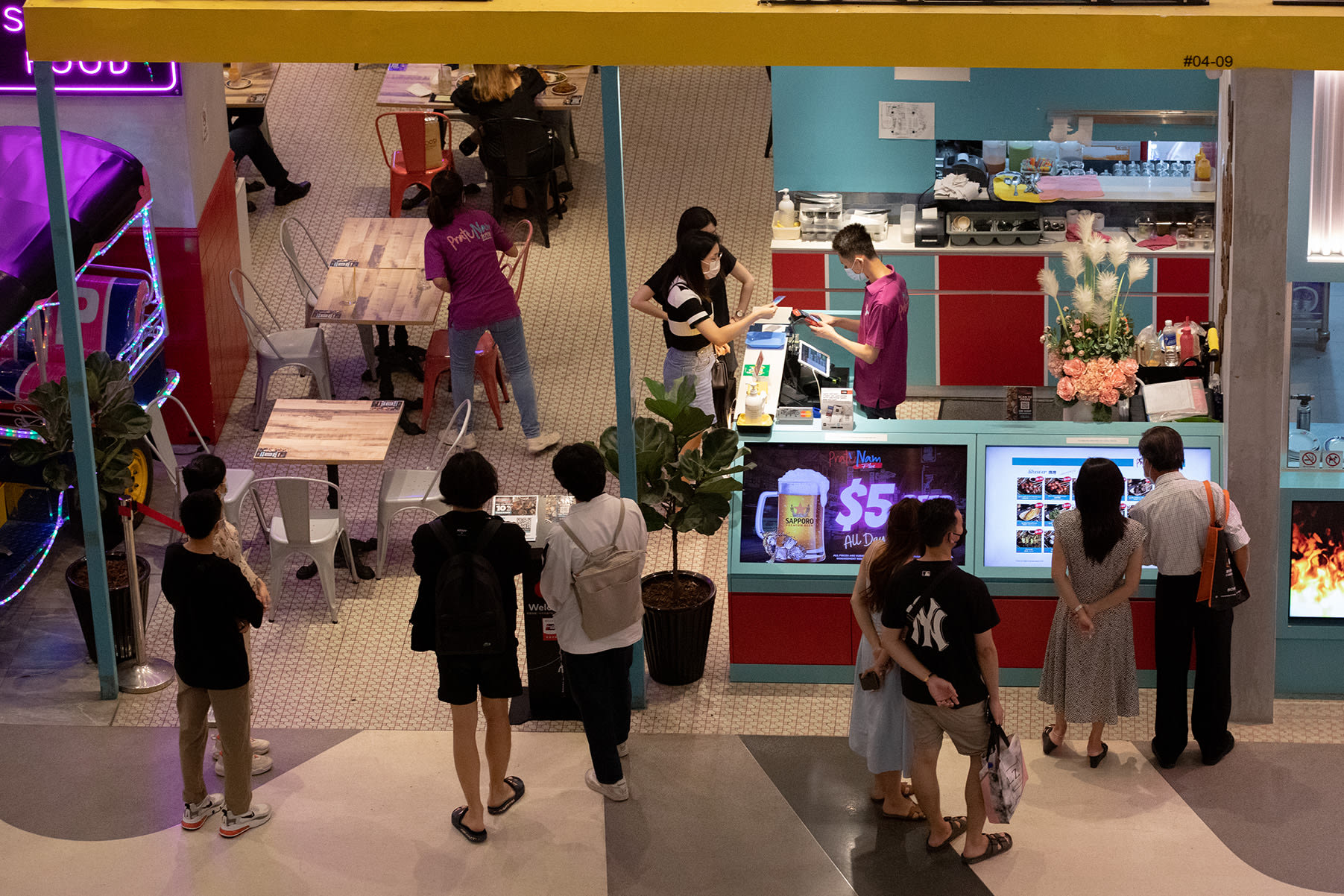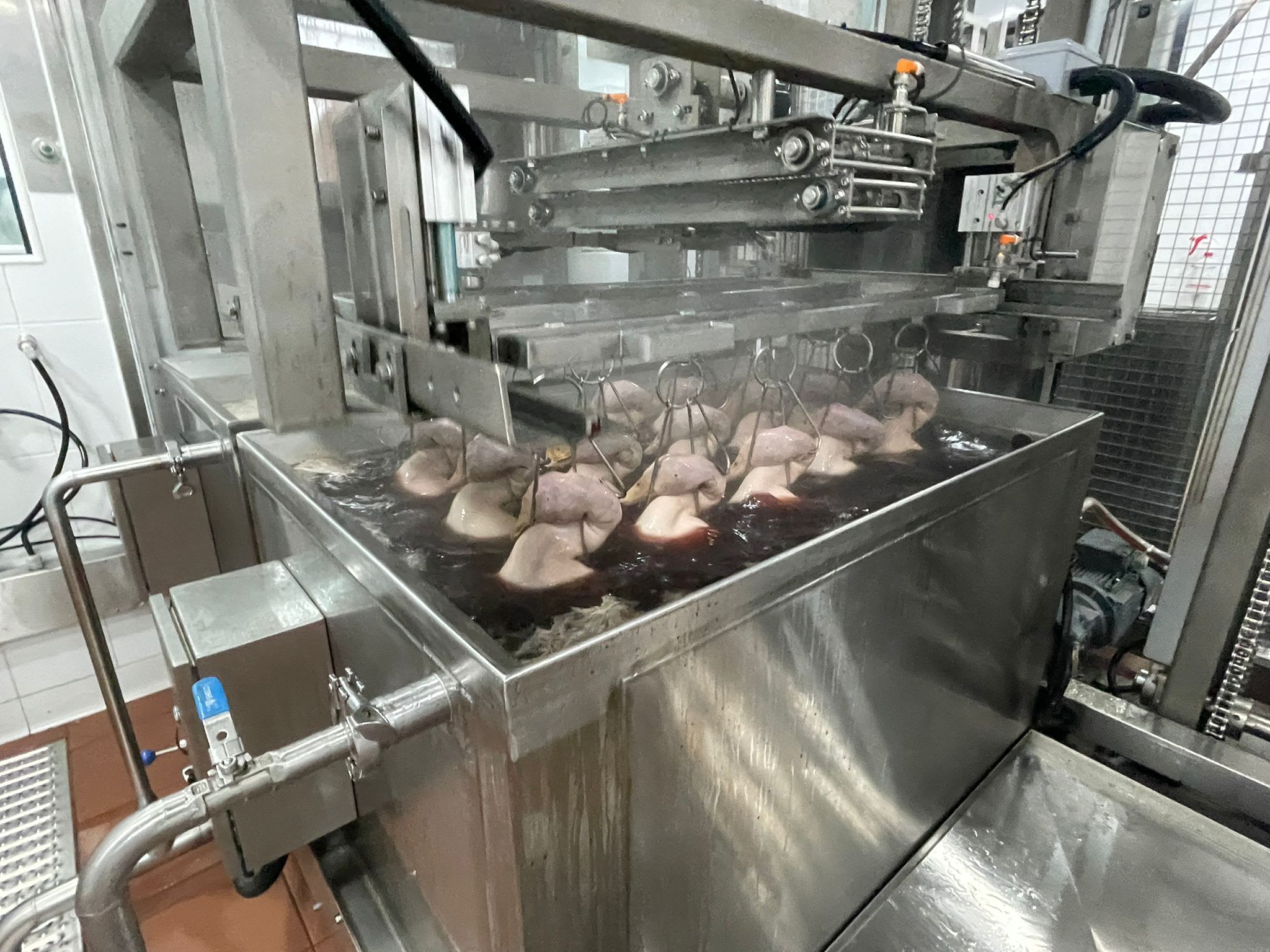The Big Read in short: F&B operators' manpower conundrum — too few workers or too many eateries?
SINGAPORE — Just months before the coronavirus landed on Singapore’s shores, Ms Anna Lim, the co-founder of The Soup Spoon, was already planning to pilot the use of self-ordering kiosks at selected outlets of the casual restaurant.

Government agencies stress the need for the sector to reduce its manpower reliance and point out that there is an 'oversaturation' in the industry, with more and more F&B firms being set up even during the pandemic years
Each week, TODAY’s long-running Big Read series delves into the trends and issues that matter. This week, we examine the food and beverage industry's manpower woes which have come in spite of policymakers' productivity push over many years. This is a shortened version of the full feature, which can be found here.
- F&B industry was among the hardest hit sectors during the pandemic over the past two years
- The sector's manpower shortage has hit home especially in recent weeks, as Singapore significantly eased its Covid-19 restrictions
- F&B businesses expect the situation to worsen and impede the sector's recovery when tourism picks up again. In fact, the interdependence between the two sectors should also make policymakers sit up to address the issue, some felt
- Govt agencies stress the need for the sector to reduce its manpower reliance and point out that there is an 'oversaturation' in the industry, with more and more F&B firms being set up even during the pandemic years
- They added that the quality of jobs and the wage levels will be adversely affected if the F&B sector doesn't raise its productivity
SINGAPORE — Just months before the coronavirus landed on Singapore’s shores, Ms Anna Lim, the co-founder of The Soup Spoon, was already planning to pilot the use of self-ordering kiosks at selected outlets of the casual restaurant.
The original plan was for a slow rollout from late 2019, to give Ms Lim and her team time to observe how customers took to it. But these plans were shelved quickly. From February, barely weeks after Singapore reported its first Covid-19 case, the team began installing the kiosks at two to three outlets a week, where possible.

“We just skipped the pilot and went for full implementation,” said Ms Lim, adding that the decision was taken partly due to the fact that her Malaysian employees were returning home which would leave the outlets shorthanded. Besides, the falling number of walk-in customers as the virus began its spread in the community also meant that there would be insufficient feedback for any trial.
By June 2020, when Singapore was at the height of the pandemic, all 27 of the restaurant’s outlets had a self-ordering kiosk.
“Previously we would require one or two staff to be at the point-of-sales system, but with the implementation of the kiosk, (our) staff could be redeployed and retrained in other functions, especially in the back of house for the delivery orders,” said Ms Lim.
The F&B industry was among the hardest hit sectors during the pandemic over the past two years. As revenue fell drastically, employees were either let go or left for greener pastures.The sector also relies heavily on workers from neighbouring countries and many decided to return home for good — or were not able to re-enter Singapore — as borders shut during the pandemic.
The total number of workers in F&B services last year stood at about 220,300 — which was about 15,000 lower than 2019, according to the Ministry of Manpower (MOM).
“The Ministry of Manpower and Enterprise Singapore said that the number of F&B companies saw a net increase of almost 1,500 in 2021 — the highest increase over the past 30 years. In 2020, there was also a net increase of about 1,300.”
However, despite the manpower shortage and the dismal business environment for F&B operators, the number of new companies in the sector, in fact, significantly outstripped those which called it quits in 2020 and 2021.
In response to TODAY's queries, MOM and Enterprise Singapore (ESG) said in a joint reply that the number of F&B companies saw a net increase of almost 1,500 in 2021 — the highest increase over the past 30 years. In 2020, there was also a net increase of about 1,300.
This happened “in spite of a generally slower growth in overall demand in this largely domestic sector”, which in turn led to a decline in operating revenue, MOM and ESG noted. Meanwhile, the F&B sector continues to be one of the least productive industries in Singapore.

"This continued increase in the number of F&B establishments has also contributed to the intensifying competition for manpower in the sector," MOM and ESG said.
The government agencies also pointed out that the sector’s low productivity "has an impact on the job quality and locals’ wages for the sizeable number of locals employed in F&B".
From 2010 to 2020, the median gross monthly income from work (excluding employer CPF contributions) of full-time employed residents in the F&B sector grew from S$1,300 to S$1,928 — and this was still below the 20th percentile income level (excluding employer CPF contributions) of all full-time employed residents.
The manpower shortage has hit home especially in recent weeks, as Singapore significantly eased its Covid-19 restrictions, including increasing the cap on social gathering sizes, allowing F&B eateries to seat 10 fully vaccinated people together, and lifting the ban on the sale and consumption of alcohol after 10.30pm at F&B establishments.
“You think without good food and F&B facilities, tourists would want to come here? What is the reason for people wanting to come to Singapore? To look at the concrete jungle?Mr Andrew Tjioe, the chief executive officer of Tung Lok Group”
And F&B businesses expect the manpower crunch to worsen and impede the sector's recovery when tourism picks up again. In fact, the interdependence between the two sectors should also make policymakers sit up to address the issue, some felt.
“You think without good food and F&B facilities, tourists would want to come here? What is the reason for people wanting to come to Singapore? To look at the concrete jungle?” said Mr Andrew Tjioe, the chief executive officer of Tung Lok Group.
The Restaurant Association of Singapore (RAS) told TODAY earlier this month that it has appealed to MOM to relook its foreign manpower policies, and consider granting the sector a different foreign worker quota from the overall services sector.
While many F&B eateries are struggling to cope with the manpower crunch, some such as The Soup Spoon and Dian Xiao Er are less adversely affected — as a result of business decisions or investments made during the pandemic.

In April last year, veteran restaurateur Samuel Yik invested in a machine costing "a few hundred thousand (dollars)" for the central kitchen of his Dian Xiao Er chain of Chinese restaurants. This has enabled the chain to not only simplify the duck-roasting process but also reduce its manpower needs.
Mr Yik acknowledged that government policies had pushed his restaurant chain to reduce its reliance on labour — and he was glad for it. “(We witnessed) a remarkably improved productivity and throughput, (which) strengthened our competitive edge against rivals,” he said.
PRE-COVID PRODUCTIVITY PUSH
For decades, the Government has been tirelessly pushing for all industries in Singapore to raise productivity, which is seen as key to higher wages and living standards.
Plagued by poor productivity, the F&B sector has been regarded as the proverbial black sheep.
In the early 2010s, the Government renewed its big push for the F&B industry to raise its productivity through automation and other forms of innovation.
For instance, in 2013, a media tour of the kitchen of homegrown restaurant chain Tung Lok was conducted where then labour chief Lim Swee Say tried food cooked by a robot.
In 2014, Timbre Group, which runs a popular chain of dining establishments, announced that it was trialling the use of drones as flying robot servers. TODAY understands that the project failed to take off but the firm has since gone on to pioneer a tray return system.
As the clarion call for all sectors to accelerate their productivity drive got increasingly louder, Mr Lim, who had become the Manpower Minister, had a clear message directed at the F&B sector in 2016.
In his speech at the Restaurant Association of Singapore’s (RAS) Epicurean Star Award Gala Dinner that year, Mr Lim noted that as the local workforce headed towards zero growth over the coming decade, the competition for local manpower would only get keener across all sectors.
He warned that if the F&B industry continued business as usual, then “manpower will become the bottleneck of growth in our future F&B industry”.
The only way out of this predicament was to transform Singapore’s economy and businesses to be more manpower-lean, he stressed.
'TOO MANY F&B EATERIES'
Apart from the MOM data showing increases in the number of F&B firms in the pandemic years of 2020 and 2021, data from the Department of Statistics (SingStats) showed that in 2020, there were 20,159 food shops here — defined as establishments licensed as retail food businesses. This represents a 2.5 per cent growth compared with 2019. The figures for last year are not yet available.
Economists told TODAY that the growth trends despite the challenging conditions caused by the pandemic were likely due to the low barriers of entry to the F&B sector.
“There are only that many people (to be customers) and we only have one mouth and one stomach. How many cups of coffee, or bowls of salad can you consume?CIMB economist Song Seng Wun on how there are too many F&B eateries in Singapore”
CIMB economist Song Seng Wun said that while there are too many F&B businesses in the market, there are "enough people with enough money to continue to think they can do something different and still make money" in the industry.
But he added: "There are only that many people (to be customers) and we only have one mouth and one stomach. How many cups of coffee, or bowls of salad can you consume?"
Mr Song noted that the pandemic has obviously shrunk the pool of prospective workers for the F&B industry and “everyone is now fighting over a smaller pie”. Enlarging the manpower pie again, through higher supply of foreign labour for instance, could increase the risk of F&B businesses not willing to innovate and be more efficient, he cautioned.
OCBC bank’s head of treasury research and strategy Selena Ling added: "Many Singaporeans are attracted to the glamour of F&B business, coupled with the perceived low barrier of entry, but may not fully realise the hard work that goes behind it... running (F&B businesses) for the long haul is not easy as many of the old-timers or survivors will tell you."
'PRESSING NEED' TO RAISE F&B SECTOR'S PRODUCTIVITY: GOVT AGENCIES
Amid the competition for manpower "due to the oversaturated F&B sector", MOM and ESG said there is a “pressing need" to improve the sector’s productivity and reduce its reliance on labour.
Based on government data, the sector's value-add per actual hour worked — a measure of labour productivity — declined from S$10 to S$8.50 from 2011 to 2020. In contrast, the value-add per actual hour worked for the whole economy rose from S$46.80 to S$56.50.
In response to TODAY's queries, RAS president Andrew Kwan noted that since 2016, the F&B industry has embarked on a Food Services Industry Transformation Map to improve productivity and embrace innovation.
Over the past 24 months, there have been more than 7,000 PSG applications for IT solutions and equipment — more than five times higher than in 2018 and 2019.
On RAS' call to increase the quota to hire more lower-skilled foreign workers, MOM and ESG pointed out that within the services sector, the F&B sector employs the largest number of foreign workers.
Increasing the Dependency Ratio Ceiling (DRC) for the F&B sector will only increase the over-reliance of such workers, the government agencies said. The DRC refers to the maximum permitted ratio of foreign workers to the total workforce that a company in the stipulated sector is allowed to hire.
MOM and ESG added: “This is likely to hold back the wage growth of our locals. This is not sustainable. Instead, we need to continue to support our businesses to transform and provide higher-paying jobs."
They reiterated that the DRC is “calibrated to allow access to foreign manpower, while providing a push to restructure and be more manpower-lean".
“This helps our businesses achieve sustainable, productivity-driven growth, improved job quality and higher wages for our workers, and greater resilience in our labour market,” said MOM and ESG. “Covid-19 has reinforced the importance of these objectives.”
COVID-19: A DOUBLE-EDGED SWORD FOR F&B FIRMS
In spite of the chaos it has caused, Covid-19 has also offered many operators a chance to restrategise their businesses.
RAS' Mr Kwan said the challenges posed by the pandemic accelerated the adoption of digital solutions by F&B businesses. "It was also manifestly clear that those with contactless ordering and payment systems gained a greater following," he said.
Dian Xiao Er’s Mr Yik added that due to the pandemic, F&B operators — including himself — were driven to find a way to overcome the persistent manpower challenges facing the industry.
Saladstop Group also made use of the Covid-19 crisis to relook its business model, said its CEO Adrien Desbaillets.
The group manages its eponymous salad bar, the Heybo and Wooshi food stores and the Good Food People online plant-based grocery store.
“The circuit breaker (in 2020) really taught us a lot of things,” said Mr Desbaillets. “We were delivering islandwide and we could start seeing concentrations of orders in certain parts of the island that we were not present in.”
Following the data, his company opened a cloud kitchen — meant for deliveries only — at Katong in June 2020. The move was a “good strategy” for the company to expand and maintain its revenues for the last two years, he added.
“Now, we are firefighting manpower issues, firefighting debt, loan services. There are a lot of other things that we are totally focused on... It is very difficult, then, to carry the automation or productivity flag.Mr Nasen Thiagarajan, CEO of Harry’s chain of bars”
While the pandemic may have given some F&B establishments a much-needed push to innovate and boost productivity, others had more pressing matters to attend to — after the Covid-19 crisis forced many businesses into survival mode.
Mr Nasen Thiagarajan, chief executive officer of the Harry’s chain of bars, said while everyone would like to focus on “productivity, automation and all that jazz”, the pandemic has set them back two years.
“Now, we are firefighting manpower issues, firefighting debt, loan services. There are a lot of other things that we are totally focused on... It is very difficult, then, to carry the automation or productivity flag,” said Mr Thiagarajan, who is also the president of the Singapore Nightlife Business Association.
'TECH IS GOOD, BUT HUMAN TOUCH IS IMPORTANT'
Prior to the pandemic, several casual dining restaurants, fast-food outlets and cafes had already put in place a digital ordering system — typically done through a tablet or a touch screen kiosk — that allowed them to reduce the need to have staff taking orders.
While all the restaurateurs interviewed recognised the benefits of technology, they pointed out that it only makes the job of F&B staff easier, and does not remove the need for human beings.

Using his restaurant’s robot servers as an example, Tung Lok Group's Mr Tjioe said someone still needs to bring the food out from the kitchen and onto the server, and then deliver it from the server to a diner’s table.
And, as Mrs Bernadette Giam puts it, it also largely depends on the concept of the restaurant.
“If it is a cafeteria style concept where customer self-service can be implemented and food is prepared offsite, the likelihood of employing more technology on-site is higher,” said the director of corporate affairs and human resources with the F&B firm Creative Eateries.
She added: “In a typical table service restaurant where customers can come to relax or conduct business lunches, service needs to be spot on. The level of customer engagement there would not be easily replaced with technology."
Unfeeling robot-servers aside, automation may also affect the way the food is prepared and its taste, said some restaurateurs.
Ms Gan Guoyi, the co-founder of the Jigger & Pony Group, said a machine that helps put together food based on a fixed ratio of ingredients may also fail to take into account the subtle nuances present in the ingredients.
For instance, she said a lemon today may not be as sour as tomorrow’s, and a human chef would be able to adjust the proportion of ingredients accordingly — something that is not currently possible with automation.
“We will never be able to eliminate the need for human touch in this service industry, with our digital wands… It is perhaps the most important element in the creation and delivery of a memorable dining experience.Mr Andrew Kwan, president of the Restaurant Association of Singapore”
RAS' Mr Kwan stressed that there is "no turning back the clock" when it comes to the digitalisation of the F&B sector which has brought great gains for the businesses.
"However, in spite of these significantly streamlined processes and upgrades in capabilities, we will never be able to eliminate the need for human touch in this service industry, with our digital wands," he said.
"It is perhaps the most important element in the creation and delivery of a memorable dining experience. We are all social beings at the end of the day."











